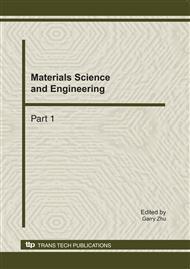p.793
p.801
p.807
p.812
p.818
p.824
p.830
p.836
p.841
The Dynamic Ant Colony Optimization Based on Permutation and its Application
Abstract:
To overcome the disadvantages of getting into local optimum of the Ant Colony Optimization, this paper proposes a dynamic adaptive ant algorithm based on permutation. To avoid algorithms getting into stagnation in their anaphase, the lower bound of pheromones is set as a nonzero constant. According to the quality of the solutions ants get in the ant colony, the best part of the ants is selected to release pheromones in a defined amount in terms of the quality of the solutions so as to enhance ants’ capability of searching for optimum solutions in anaphase. The algorithm adopts a more intelligent selection rule of behavior , so the ants can adjust the balance coefficient between exploration and development dynamically in the searching process to effectively inhibit precocity phenomenon in the process of convergence,and improve the searching capability of the algorithm.
Info:
Periodical:
Pages:
818-823
Citation:
Online since:
January 2011
Authors:
Keywords:
Price:
Сopyright:
© 2011 Trans Tech Publications Ltd. All Rights Reserved
Share:
Citation:


